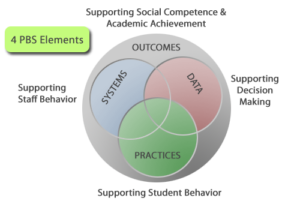Positive Behavior Intervention Support, or PBIS, is a framework to synthesize existing behavior systems with common language and common expectations. PBIS aims to establish school-wide expectations for appropriate behavior and consistently apply positive reinforcement of these behaviors.
There are four main elements of PBIS:
- Outcomes: academic and behavior targets that are endorsed and emphasized by students, families, and educators
- Practices: interventions and strategies that are evidence-based.
- Data: information that is used to identify status, need for change, and effects of interventions
- Systems: supports that are needed to enable the accurate and durable implementation of the practices of PBIS

PBIS is not meant to take the place of any behavior management systems teachers and schools may already be using, but rather it should be used as a way to tie these initiatives together into a “framework that works toward a common language, common practice, and consistent application of positive and negative reinforcement.”
In the same vein, Centervention programs are not meant to take the place of PBIS; using our research and evidence-based games and resources will support PBIS and help to make it more effective.

Centervention programs enhance PBIS in five ways
Critical Thinking
Complementing the explicit positive behavior examples provided on the PBIS matrix, our games are tools for students to think critically about their behavior choices. Students will learn important skills that can be applied to various situations, such as which tone of voice is most appropriate when showing empathy and cooperating with others, and how to identify and manage their own emotions, helping them to think before acting. The social and emotional skills strengthened in Centervention programs will support the expected behaviors targets your school chooses to focus on within the framework of PBIS.
Skill Building
Centervention programs can be used as the intervention component of your PBIS program. Zoo U, for example, offers five intervention scenes for each of its six skills, for a total of 30 scenes that continue to differentiate to individual students based on the choices they make within the game. Principal Wild gives personalized feedback after each intervention scene, specifically praising appropriate behavior and providing guidance for situations in which students could have made better choices. Teachers simply do not have the time to provide such specific and personalized feedback for every student during real-life situations. In addition to the online games, free, in-person lessons and activities that can be used with individual students, small groups, or whole class instruction can be found on Centervention’s website. These lessons take the burden of creation off of busy teachers, and reinforce both the social and emotional skills taught in the online games and school-wide PBIS goals.
Data and Measuring Success
The reports in each game provide an extra data set to measure success. The assessments at the start of Zoo Academy, Zoo U, or Hall of Heroes provide baseline data on students’ social and emotional skills that can be used to identify status and need for change, and can show trends across classrooms and grade levels. The entire 4th grade, for example, may rank in the 30th percentile for cooperation. This could be a barrier to the school’s goal of respect, and they may decide to focus more heavily on cooperation skills in the classroom. Data from the games’ skill building portions can be used to help determine the effects of interventions.
Common Language
Centervention programs can help to provide a common language for everyone in the school community, including students, families, and educators. “Consistency from class to class and adult to adult is very important for successful implementation” of school-wide PBIS. Emotion regulation, impulse control, stop and think, communication, empathy, cooperation, respect, responsibility, and social initiation, among other core concepts from the online games, can become important vocabulary terms used to effectively communicate about appropriate behavior. Teachers can reference scenes in the games to help students connect their skills to real-life situations. For example, a teacher may say to an upset student at recess, “Remember, in Zoo U, when you were frustrated that you couldn’t play basketball because they already had enough players? What did you do then?” The student may remember that he needs to find a place to cool down and think about how he feels before joining another game. Students can also offer the same guidance to each other, helping them to peer-mediate problems without involving an adult.
Consistency in Reinforcement
Schools can also use the common language from Centervention to be consistent in specifically praising appropriate behavior. This consistency will enable the accurate and durable implementation of PBIS. Inconsistent reinforcement or consequences causes confusion among students and staff and could lead to more behavior problems. When a student’s actions demonstrate any of the social and emotional skills, she could earn a “gotcha” slip, or another reward your school may offer. For example, Johnny is caught asking Billy to join his group at lunch, when Billy had been eating alone. Johnny is showing empathy, so he gets a slip. In another instance, Susie is caught cooperating with Jenny; the girls are taking turns deciding which activity to do as they work as a pair in the art room. They both earn slips.
Both PBIS and Centervention programs involve “teaching, modeling, practicing, and rewarding appropriate behavior and having clear consequences for targeted behaviors.” Centervention programs support a positive school culture through practice in a safe, virtual school setting, and provide personalized, corrective feedback to each student. By using PBIS and Centervention together, schools give all students the best chance to succeed.